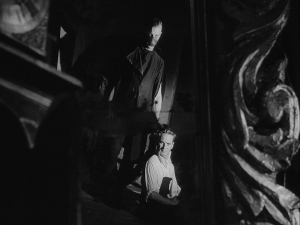Film In memoriam, Ingmar
Posted By Jonathan Rosenbaum on 08.07.07 at 01:09 PM
In response to the recent death of Ingmar Bergman, the Chicago Cinema Forum has organized a Bergman marathon (Chicagoist termed it a “crash course in Bergman”) to be held at the Chopin Theatre this coming weekend. Included will be the local premiere (two screenings) of a recent three-part, three-hour documentary about Bergman made for Swedish TV and screenings of five major Bergman features: 16-millimeter prints of Sawdust and Tinsel (1953), The Seventh Seal (1957), Wild Strawberries (1957), and Persona (1966), and a DVD projection of the 188-minute version of Fanny and Alexander (1982), a Bergman miniseries that was the last thing he ever shot on film.
All five of the features will be introduced and discussed by local critics. I’ll be trying my hand at Sawdust and Tinsel, and the founder of Chicago Cinema Forum (and organizer of this event), Gabe Klinger, will do Fanny and Alexander; WBEZ producer Alison Cuddy will introduce The Seventh Seal, Time Out Chicago‘s Ben Kenigsberg will introduce Wild Strawberries, and National Louis University prof Robert Keser will introduce Persona. The social aspect of the Chicago Cinema Forum has been a central part of Klinger’s project from the beginning, and two hour-long receptions on Saturday and Sunday, offering a further chance to discuss Bergman, are also scheduled.
As it happens, I had already made plans to show Bergman’s The Magician (1958) as part of a lecture course I’ll be teaching this fall at the Gene Siskel Film Center well before his death. And after I agreed to introduce Sawdust and Tinsel at Klinger’s event, I was invited about a week ago to write an op-ed piece about Bergman for the New York Times (registration required) that’s less reverential than these other activities might suggest. [2014 note: for my original draft of this piece — which had to be rewritten for the commissioning editor at least three times, in part because he wanted me to make it more negative — please go here.]
Having more recently seen the second part of the Bergman documentary being shown, devoted exclusively to Bergman’s prodigious career as a theater director–which I would argue (and Bergman himself maintained) is more important than his career as a filmmaker–I can strongly recommend it as an eye-opener. And if I had to recommend only one film to see by Bergman, I’d probably pick Persona–though I hasten to add, with some embarrassment, that I still haven’t seen Fanny and Alexander, which many regard as Bergman’s masterpiece, and which I’m planning to catch up with this weekend.
Tags: Ingmar Bergman, Chicago Cinema Forum, Fanny and Alexander, theater, Image
Showing 1-50 of 109



